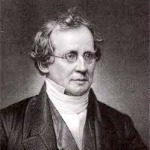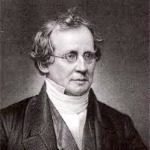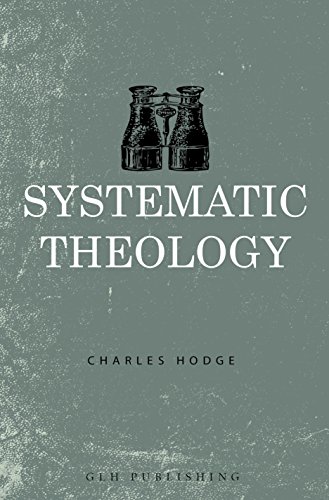
Quotes by Charles Hodge
Idolatry consists not only in the worship of false gods, but also in the worship of the true God by images.
[The Trinity is] the fundamental doctrine of Christianity.
A Christian is one who recognizes Jesus as the Christ, the Son of the living God, as God manifested in the flesh, loving us and dying for our redemption; and who is so affected by a sense of the love of this incarnate God as to be constrained to make the will of Christ the rule of his obedience, and the glory of Christ the great end for which He lives.
This is true religion, to approve what God approves, to hate what He hates, and to delight in what delights Him.
The proximate result of obedience to God is inward conformity to the Divine image
The Holy Spirit as the Spirit of truth, of holiness, and of life in all its forms, is present with every human mind, enforcing truth, restraining from evil, exciting to good, and imparting wisdom or strength, when, where, and in what measure seems to Him good… This is what in theology is called common grace.
It is a fact that unless children are brought up in the nurture and admonition of the Lord, they, and the society which they constitute or control, will go to destruction. Consequently, when a state resolves that religious instruction shall be banished from the schools and other literary institutions, it virtually resolves on self-destruction.
No more soul-destroying doctrine could well be devised than the doctrine that sinners can regenerate themselves, and repent and believe just when they please. As it is a truth both of Scripture and of experience that the unrenewed man can do nothing of himself to secure his salvation, it is essential that he should be brought to practical conviction of that truth. When thus convinced, and not before, he seeks help from the only source whence it can be obtained.
Christian humility does not consist in denying what there is of good in us; but in an abiding sense of ill-desert, and the consciousness that what we have of good is due to the grace of God.
An Exposition of the First Epistle to the Corinthians, 1959, p. 317, by permission Banner of Truth, Carlisle PA.
The doctrines of grace humble a man without degrading him and exalt a man without inflating him.
The Spirit never makes men the instruments of converting others until they feel that they cannot do it themselves; that their skill in argument, in persuasion, in management, avails nothing.
The gospel is so simple that small children can understand it, and it is so profound that studies by the wisest theologians will never exhaust its riches.
The best evidence of the Bible’s being the word of God is to be found between its covers. It proves itself.
When really weak in ourselves, and conscious of that weakness, we are in the state suited to the manifestation of the power of God. When emptied of ourselves, we are filled with God. Those who think they can change their own hearts, atone for their own sins, subdue the power of evil in their own souls or in the souls of others, who feel able to sustain themselves under affliction, God leaves to their own resources. But when they feel and acknowledge their weakness, he communicates to them divine strength.
Christ’s righteousness is so imputed to believers that their justification is not merely the act of a sovereign dispensing with law but the act of a judge declaring the law to be satisfied.
To be in Christ is the source of the Christian’s life; to be like Christ is the sum of His excellence; to be with Christ is the fullness of His joy.
The sure test of the quality of any supposed change of heart will be found in its permanent effects. Whatever, therefore, may have been our inward experience, whatever joy or sorrow we may have felt, unless we bring forth fruits meet for repentance, our experience will profit us nothing. Repentance is incomplete unless it leads to confession and restitution in cases of injury; unless it causes us to forsake not merely outward sins, which others notice, but those which lie concealed in the heart; unless it makes us choose the service of God and live not for ourselves but for Him. There is no duty, which is either more obvious in itself, or more frequently asserted in the Word of God, than that of repentance.
All divine names and titles are applied to Him. He is called God, the mighty God, the great God, God over all; Jehovah; Lord; the Lord of lords and the King of kings. All divine attributes are ascribed to Him. He is declared to be omnipresent, omniscient, almighty, and immutable, the same yesterday, today, and forever. He is set forth as the creator and upholder and ruler of the universe. All things were created by Him and for Him; and by Him all things consist. He is the object of worship to all intelligent creatures, even the highest; all the angels (i.e., all creatures between man and God) are commanded to prostrate themselves before Him. He is the object of all the religious sentiments; of reverence, love, faith, and devotion. To Him men and angels are responsible for their character and conduct. He required that men should honour Him as they honoured the Father; that they should exercise the same faith in Him that they do in God. He declares that He and the Father are one; that those who had seen Him had seen the Father also. He calls all men unto Him; promises to forgive their sins; to send them the Holy Spirit; to give them rest and peace; to raise them up at the last day; and to give them eternal life. God is not more, and cannot promise more, or do more than Christ is said to be, to promise, and to do. He has, therefore, been the Christian’s God from the beginning, in all ages and in all places.
The Scriptures teach that the happiness or blessedness of believers in a future life will be greater or less in proportion to the service of Christ in this life. Those who love little, do little; and those who do little, enjoy less.
What then were the apostles? It is plain from the divine record that they were men immediately commissioned by Christ to make a full and authoritative revelation of His religion; to organize the church; to furnish it with officers and laws, and to start it on its career of conquest through the world… The apostles, the twelve, stand out just as conspicuous as an isolated body in the history of the church, without predecessors, and without successors, as Christ Himself does. They disappear from history. The title, the thing itself, the gifts, the functions, all ceased when John, the last of the twelve, ascended to heaven.
In opposition…to all the suggestions of the devil, the sole, simple, and sufficient answer is the word of God. This puts to flight all the powers of darkness. The Christian finds this to be true in his individual experience. It dissipates his doubts; it drives away his fears; it delivers him from the power of Satan.

